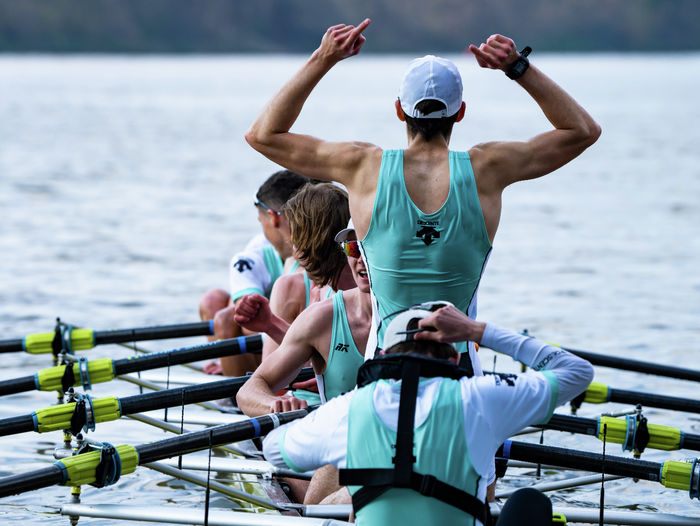“Gay men are often invisible”: Sports journalist Adam Crafton on the problem of homophobia in football
The Athletic’s Adam Crafton speaks to Varsity about being one of the few gay male journalists at the Qatar World Cup, and how men’s football at large needs an attitude change

After graduating from Cambridge in 2016, Adam Crafton has become a rising star within sport journalism. Having previously written for The Tab and the Daily Mail, Crafton currently works for sports newspaper The Athletic, and in 2022 flew to Qatar to report on the World Cup.
Whilst Crafton reported on the shocks, the scores and the storylines inevitable in a major tournament, he also told a different story. Crafton spoke to me with sensitivity and insight about being what it meant to be a gay man in Qatar, and in football as a whole.
He first wants to stress how “physically safe” he felt while reporting in Qatar, but admits that, “psychologically, it was very draining.” As one of the only gay British male sportswriters in Qatar, Crafton confesses that it felt like “broadcasters or radios had a list of gays to go to for a voice on whatever’s happening… [I] was getting three or four calls a day from radio stations across the UK.” This made Crafton understandably anxious: “it felt like people were looking at you, what is he going to do? What’s he going to say?”
Being one of the “gays to go to” was immense pressure for Crafton, as there are very few spokespeople for the LGBTQ+ community in football. Unlike typical footballing causes such as anti-racism, which are supported by many brave and inspiring voices, there are almost no openly gay elite male footballers.
Crafton tells me that, “with homophobia, journalists don’t really know how to cover it”, because “apart from a couple ex-players [and] a player at Blackpool who is 17 years old” there aren’t enough voices. “It makes it really difficult to humanise that story”. As Crafton put it in his article: “elite men’s football and the state of Qatar are united in that trait: gay men are often invisible and their experiences go unheard.”
“The statement ‘“I’m not going to stand up for what I believe in for a yellow card” is pathetic.’”
The one occasion that the LGBTQ+ community was discussed, but only obliquely, was during the farce of the ‘One Love’ armband. This story, Crafton points out, gained more traction than other conversations about LGBTQ+ rights because the debate boiled down to one simple question for journalists to cover: “are they going to wear the armband or are they not?”
Crafton says, “you’ll do well to find an example of any players or coaches who really, actually spoke about the issue [of LGBTQ+ rights] at the tournament.” Even the armband, called, notably, ‘One Love’ instead of something more overt like ‘Pride’, “doesn’t really even look like a rainbow. [...] I’ve not heard any England player talk about the LGBT laws in Qatar, I’ve not heard Gareth Southgate talk about the feelings of LGBT fans”.
I ask Crafton if he was disappointed by England’s choice to not wear the armband, even in the context of the sanctions it would have incurred. Crafton tells me he understands as a football fan why they didn’t, but that deep down the sentiment “‘I’m not going to stand up for what I believe in for a yellow card’ is pathetic”.
Crafton was even more irritated by “the fact that Gareth Southgate said that players were not involved in the decision not to wear the armband”. He argues, “if that was a decision about whether they take the knee or not, there’s not a chance the players wouldn’t be involved.” I ask Crafton if this indicated an assumption of uniform heterosexuality among all the players by the FA: “Yeah, I think it’s a perception that it’s not a personal experience for them.”
Despite this, Crafton still feels that men’s football in England is an inclusive place for queer people.
“I spend a lot of my life telling gay friends who want nothing to do with men’s football that things are getting better.” However, “in terms of education and awareness there is still a lot that could be done.” In a meeting with Premier League organisers, Crafton argued that “managers of clubs should be given homophobia-specific courses [...] This felt so obvious, but they haven’t done it, so I start wondering, ‘Why do you even ask us?’”
In light of all this, can we still enjoy football ethically? “We do, don’t we, we just do. We take pleasure from it […] That is why authoritarian states use it, because of that power… we’ve seen it throughout history.”
“People work, and at the end of the week they watch their football team, and they feel their football team. To tell someone they can’t support them because the club has changed owners is wrong. [...] What I associate with Manchester United is childhood and family and nostalgia and I wouldn’t want to give that up.” Football is a cultural force, entangled with identity, memory and sense of place so strongly that, even when its power is abused, we cannot give up on it.
 News / Eight Cambridge researchers awarded €17m in ERC research grants27 December 2025
News / Eight Cambridge researchers awarded €17m in ERC research grants27 December 2025 News / Downing investigates ‘mysterious’ underground burial vault 29 December 2025
News / Downing investigates ‘mysterious’ underground burial vault 29 December 2025 News / News in Brief: carols, card games, and canine calamities28 December 2025
News / News in Brief: carols, card games, and canine calamities28 December 2025 Sport / Hard work, heartbreak and hope: international gymnast Maddie Marshall’s journey 29 December 2025
Sport / Hard work, heartbreak and hope: international gymnast Maddie Marshall’s journey 29 December 2025 Interviews / Meet Juan Michel, Cambridge’s multilingual musician29 December 2025
Interviews / Meet Juan Michel, Cambridge’s multilingual musician29 December 2025







